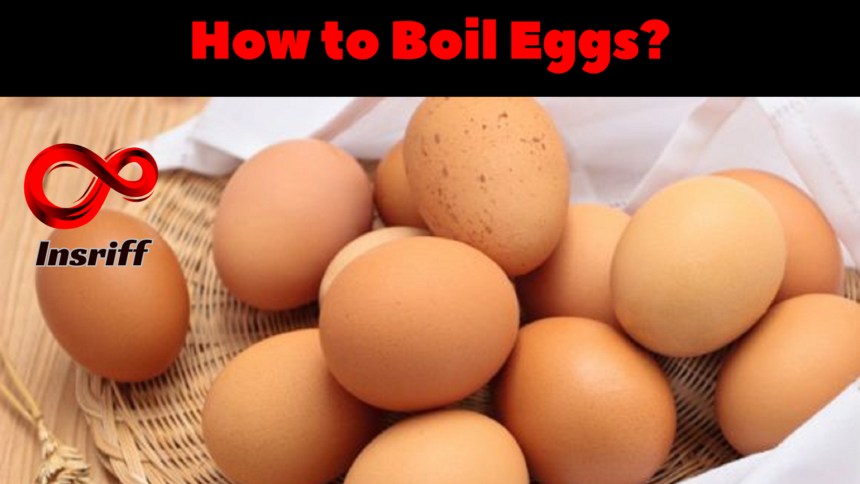Boiling eggs could possibly look like a simple challenge; however, attaining the precise texture can be tricky. Whether you love gentle, medium, or hard-boiled eggs, this guide will walk you through the steps of how to boil eggs. Follow those smooth steps to make boiled eggs that might be easy to peel and delicious to eat.
Why Boiled Eggs?
Boiled eggs are a remarkable source of protein and make a quick, healthy snack. They’re additionally flexible and become into meals from breakfast to dinner or even as a salad topping. Knowing how to boil eggs efficiently guarantees they come out ideal each time whether or not you need them gentle or absolutely hard-boiled.
Read how white eggs are good for muscle growth.
Step-by using-Step Guide to Boiling Eggs
To boil an egg properly, you just need to follow these 7 steps. These steps will help you to cook eggs according to your needs. So, let’s start our journey.
1. Select the Right Eggs
Use fresh eggs if feasible but slightly older eggs are less complicated to peel. If you’ve got eggs some days past purchase, those might work properly for tough-boiled alternatives.
2. Prepare the Water
Place your eggs in a pot and fill it with cold water and ensure the eggs are completely submerged. The cold water helps cook the eggs evenly for dinner because it gradually heats up with the eggs inside.
Tip: Add a pinch of salt or a teaspoon of vinegar to the water. This can make peeling easier and save the eggs from cracking as they cook.
3. Bring to a Boil
Adjust the heat to medium-high after setting the pan on the stove. Allow the water to reach a full and rolling boil. Once the water boils, cover the head of the pot and turn off the stove.
4. Set a Timer
The timing relies upon how you want your eggs:
- Soft-boiled (yolk slightly runny): 4-6 mins
- Medium-boiled (yolk creamy, now not runny): 7-nine mins
- Hard-boiled (completely cooked yolk): 10-12 minutes
Set a timer for your chosen degree of doneness to make sure they come perfectly each time.
5. Cool the Eggs Quickly
Once your eggs have finished cooking then switch them to a bowl of iced water. This will stop the cooking method and make peeling simpler. Let them sit in the ice water for approximately 5 minutes or till they’re cool to the touch.
Tip: Gently tap the eggs on the counter and roll them underneath your hand before peeling them to loosen the shell.
6. Peel and Enjoy!
To peel, tap the egg gently on a hard surface and gently roll it to crack the shell. Start peeling from the wider end, where there is often a tiny air pocket. The shell should come off effortlessly if the eggs are properly chilled.
Boiling Times for Different Types of Eggs
- Soft-Boiled Eggs: If you pick a soft-boiled egg with a runny yolk, prepare dinner for 4-6 minutes. These are perfect for dipping toast or adding to ramen.
- Medium-Boiled Eggs: For a yolk that is barely creamy but now not liquid then cook for 7-9 minutes. This type is ideal for salads and breakfast bowls.
- Hard-Boiled Eggs: Fully-cooked yolks require 10-12 mins of cooking. These eggs are great for snacks, egg salads or as a protein-packed addition to meals.
Troubleshooting Common Problems
- Green Rings around Yolks: A green-gray ring around the yolk method causes the egg to become overcooked. So, reduce the cooking time next time.
- Eggs that Don’t Peel Easily: Older eggs commonly peel higher. If you’ve got very fresh eggs, consider including a splash of vinegar or a pinch of salt in the water.
- Cracked Eggs While Boiling: This can appear if the water heats too fast. To avoid it, start with cold water and bring it to a slow boil.
How to Store the Boiled Eggs?
Boiled eggs can be preserved in the fridge for up to a week. Keep them unpeeled in an included place to keep them fresh. If they’re already peeled, store them in an airtight container with a moist paper towel to keep them from drying out.
Final Tips for Perfect Boiled Eggs
- Test Doneness: If you’re unsure about the doneness, spin the egg on a flat surface. Hard-boiled eggs will spin readily but softer eggs may wobble as well.
- Use a Timer: Consistency is excellent so usually set a timer.
- Ice Bath: Never forget the ice tub; it makes peeling much less complicated and prevents overcooking.
Now, how to boil eggs like a pro? From soft to tough-boiled, you can enjoy eggs simply in the way you like them. Whether they’re part of a meal, snack or salad, perfectly boiled eggs are always a tasty and nutritious preference.
Happy boiling!









